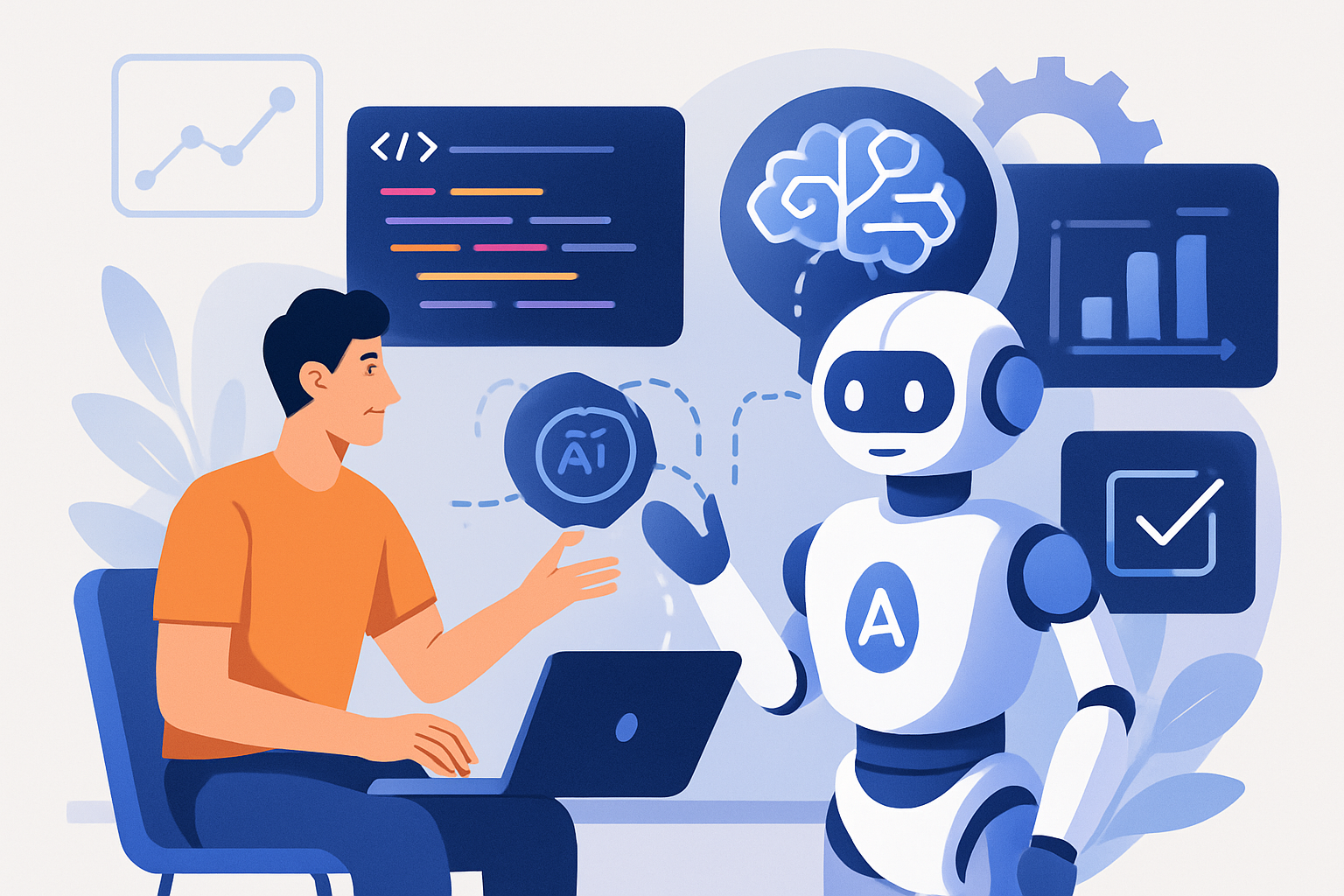7 months ago
The Impact of AI on Software Development Practices
Artificial Intelligence (AI) is reshaping industries—and at the heart of this transformation is software development. What once relied solely on human logic and manual processes is now being reimagined by algorithms, automation, and intelligent decision-making. AI is not only accelerating development cycles but also unlocking new ways of coding, testing, deploying, and maintaining software.
In this article, we’ll explore how AI app development and AI agent development are transforming modern development workflows, and why businesses are leaning toward custom software development solutions infused with AI capabilities.
Automating Repetitive Tasks in the Development Cycle
One of the most significant impacts of AI on software development is its ability to automate repetitive and time-consuming tasks. Developers now use AI tools that can write boilerplate code, refactor functions, or even suggest optimal methods based on context.
Code assistants like GitHub Copilot leverage large language models to recommend real-time code snippets, reducing manual effort. This automation doesn't replace developers—it enhances their productivity and allows them to focus on higher-level problem solving and innovation.
Enhancing Code Quality and Error Detection
AI-driven testing frameworks can now analyze code for bugs, security vulnerabilities, and performance issues before deployment. Tools like DeepCode and SonarQube use machine learning to detect hidden flaws that traditional static analysis might miss.
This real-time feedback loop ensures that code quality is maintained throughout the software lifecycle, making releases more stable, secure, and reliable. As AI development advances, these systems become more intelligent with every line of code they process.
AI App Development for Smarter User Experiences
AI app development is empowering software teams to build applications that understand, predict, and adapt to user behavior. From voice assistants to recommendation engines and personalized dashboards, AI transforms static apps into interactive and context-aware experiences.
These intelligent features improve customer satisfaction and engagement. In mobile environments especially, AI enables real-time personalization that drives higher user retention. Businesses now demand software that doesn’t just work—it thinks.
Role of AI Agent Development in Software Ecosystems
AI agent development refers to creating autonomous agents that can make decisions, interact with users, and perform tasks independently. These agents play a key role in intelligent systems—from customer service bots to smart automation tools within enterprise applications.
In software development, AI agents can manage test execution, optimize build pipelines, or act as intelligent documentation generators. Their ability to operate with minimal human input boosts operational efficiency and supports agile delivery models.
Accelerating Custom Software Development
Companies increasingly turn to custom software development to meet specific business needs. When infused with AI capabilities, custom platforms can automate internal workflows, enhance data analysis, and provide predictive features tailored to the business model.
Whether it’s a healthcare system that uses AI for diagnostics or a logistics app that optimizes delivery routes, AI-powered custom solutions allow businesses to stay competitive while future-proofing their technology stack.
Intelligent Project Management and Resource Allocation
AI-powered project management tools are revolutionizing how development teams track progress, assign resources, and manage sprints. Platforms like Jira or Trello now integrate machine learning to predict project delays, suggest task reallocations, and optimize team performance.
This makes development cycles more transparent and efficient, especially for remote or hybrid teams managing complex product roadmaps.
Improving Testing with AI-Powered Automation
AI significantly enhances the speed and accuracy of testing in software development. From unit testing to integration and regression testing, AI can automatically generate test cases based on code structure or past behavior.
AI test bots can even simulate user behavior, detect UI inconsistencies, and validate user journeys across devices. This not only reduces human effort but also shortens QA timelines and improves overall software reliability.
visit-https://www.sparkouttech.c...
Artificial Intelligence (AI) is reshaping industries—and at the heart of this transformation is software development. What once relied solely on human logic and manual processes is now being reimagined by algorithms, automation, and intelligent decision-making. AI is not only accelerating development cycles but also unlocking new ways of coding, testing, deploying, and maintaining software.
In this article, we’ll explore how AI app development and AI agent development are transforming modern development workflows, and why businesses are leaning toward custom software development solutions infused with AI capabilities.
Automating Repetitive Tasks in the Development Cycle
One of the most significant impacts of AI on software development is its ability to automate repetitive and time-consuming tasks. Developers now use AI tools that can write boilerplate code, refactor functions, or even suggest optimal methods based on context.
Code assistants like GitHub Copilot leverage large language models to recommend real-time code snippets, reducing manual effort. This automation doesn't replace developers—it enhances their productivity and allows them to focus on higher-level problem solving and innovation.
Enhancing Code Quality and Error Detection
AI-driven testing frameworks can now analyze code for bugs, security vulnerabilities, and performance issues before deployment. Tools like DeepCode and SonarQube use machine learning to detect hidden flaws that traditional static analysis might miss.
This real-time feedback loop ensures that code quality is maintained throughout the software lifecycle, making releases more stable, secure, and reliable. As AI development advances, these systems become more intelligent with every line of code they process.
AI App Development for Smarter User Experiences
AI app development is empowering software teams to build applications that understand, predict, and adapt to user behavior. From voice assistants to recommendation engines and personalized dashboards, AI transforms static apps into interactive and context-aware experiences.
These intelligent features improve customer satisfaction and engagement. In mobile environments especially, AI enables real-time personalization that drives higher user retention. Businesses now demand software that doesn’t just work—it thinks.
Role of AI Agent Development in Software Ecosystems
AI agent development refers to creating autonomous agents that can make decisions, interact with users, and perform tasks independently. These agents play a key role in intelligent systems—from customer service bots to smart automation tools within enterprise applications.
In software development, AI agents can manage test execution, optimize build pipelines, or act as intelligent documentation generators. Their ability to operate with minimal human input boosts operational efficiency and supports agile delivery models.
Accelerating Custom Software Development
Companies increasingly turn to custom software development to meet specific business needs. When infused with AI capabilities, custom platforms can automate internal workflows, enhance data analysis, and provide predictive features tailored to the business model.
Whether it’s a healthcare system that uses AI for diagnostics or a logistics app that optimizes delivery routes, AI-powered custom solutions allow businesses to stay competitive while future-proofing their technology stack.
Intelligent Project Management and Resource Allocation
AI-powered project management tools are revolutionizing how development teams track progress, assign resources, and manage sprints. Platforms like Jira or Trello now integrate machine learning to predict project delays, suggest task reallocations, and optimize team performance.
This makes development cycles more transparent and efficient, especially for remote or hybrid teams managing complex product roadmaps.
Improving Testing with AI-Powered Automation
AI significantly enhances the speed and accuracy of testing in software development. From unit testing to integration and regression testing, AI can automatically generate test cases based on code structure or past behavior.
AI test bots can even simulate user behavior, detect UI inconsistencies, and validate user journeys across devices. This not only reduces human effort but also shortens QA timelines and improves overall software reliability.
visit-https://www.sparkouttech.c...
Sponsored by
Quearn
2 yr. ago



